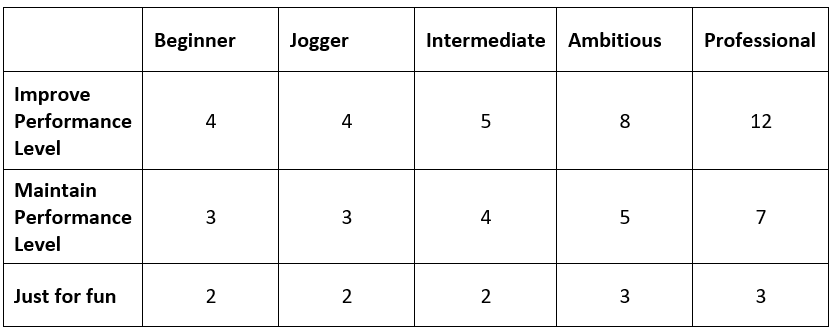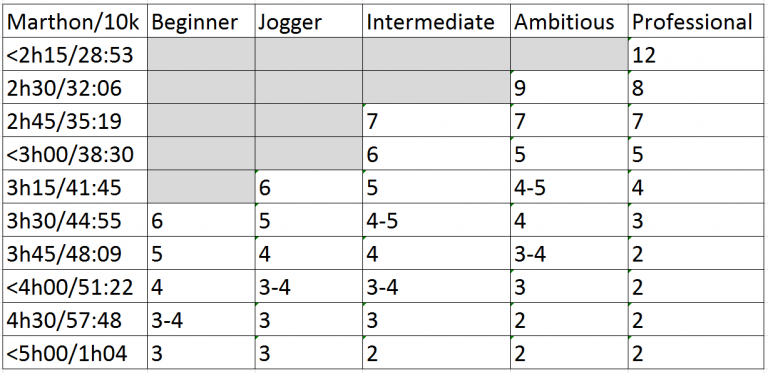Whether you are a beginner, intermediate or experienced runner, the million dollar question is how often should you run? The answer is, it depends. Unfortunately the answer is not as simple as a number of hours or days. Here are some tips on how to figure out what the right amount of training is for you.
Running is about balancing training and rest. The most important factors to consider when deciding how much you should train is your experience level/previous training volume, your goals and of course the other obligations you have in your life.
What is the right for me?
Our partners at running coach wrote an article on that takes a deeper dive on this topic that you can read here. But one good way to see how often you should run is to consult the following table:

You could also consult the following table based on race times for a marathon or 10k race:

The minimum and maximum
If you are running just for health reasons with no ambitions to compete then two or three times a week can be enough. If you are in this situation you should still be sure you are moving enough on the days that you do not run and consider adding other forms of exercise to maintain your health
As you can see from the tables above, as your goals change, how often you should run and what the runs are like also changes. When you are running with a more specific goal you should have one of your sessions be an interval or tempo training as well as a longer run weekly. Once you get to the top end, you might run daily or even more than once daily.
Daily running and doubling (running twice in a day) is reserved for only the most ambitious athletes. Our aerobic system recovers quicker than other musculoskeletal systems. As a result once you have gained enough fitness the time between certain training sessions is enough to recover even if it is less than 24 hours. Once you are training at this level having a structured training plan with periodization is crucial.
Life impacting training
Professionals can train up to 20 hours a week. As you can see above, this is not necessary for most athletes. It is also almost impossible for most people balancing a job and other priorities. However some ambitious non professionals are able to balance full time work, families, and training at a top level. The key is to find the time in your day where you can consistently fit in training. This may be in the morning, evening, or during a lunch break. You just need to find what works for you personally.
How well you recover also influence how often you should run and this is dependent on other variables in your life. Ensuring that you get enough sleep and proper nutrition will ensure that you are ready for your next training session.
Other things to consider
The amount you should train can also be influenced by your history with injuries and the sport you are doing. For example, runners can not train as much as cyclists and triathletes because of the high impact nature of running. If you have a history of injuries you might consider substituting one of your weekly sessions with a low impact form of cross training. Some examples of low impact cross training are, swimming, cycling, aqua jogging, cross country skiing, elliptical or rowing.
It can also be a great benefit to incorporate other sports in your training. The variety will keep you interested and make you a more complete athlete. Strength training is another often neglected but beneficial tool for runners. If you have time in you schedule it is worth considering adding this to training.
